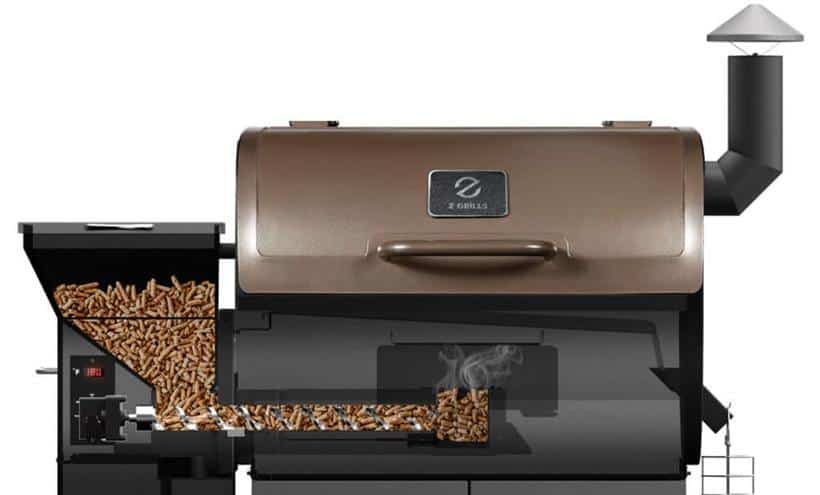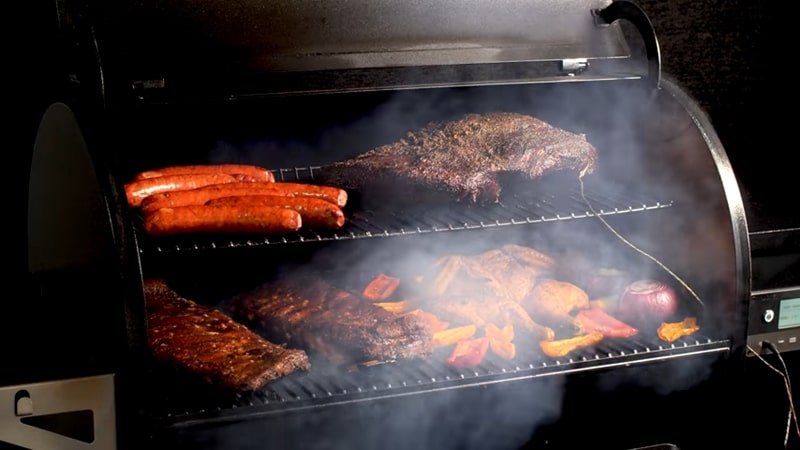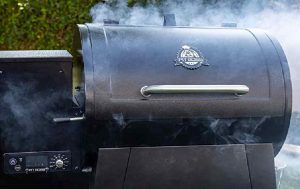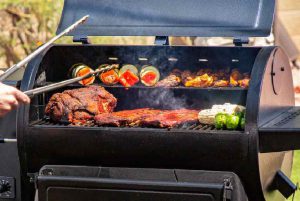Discover the mechanics behind these grills, blending the irresistible taste of wood-fired cooking with user-friendly features and cutting-edge technology.
Unveil the advantages and disadvantages of pellet grills, and evaluate their distinct benefits and potential downsides.
- What is a pellet grill?
- How do pellet grills work?
- Why Pellet Grills?
- Pros and Cons of Pellet Grills
- Pellet Grill vs. Traditional Smoker
- Pellet Grill vs. Propane (Gas) Grills
- Pellet Grill vs. Charcoal
- Pellet Grills vs Electric Smokers
What is a pellet grill?
A pellet grill is a versatile outdoor cooker that blends the best aspects of smokers, charcoal and gas grills, and conventional ovens.
Fueled by 100% all-natural hardwood pellets, these grills offer a consistent and controllable heat source for a wide range of cooking methods, from smoking and grilling to roasting and baking.
Invented in the 1980s by Joe Traeger, the original pellet grill took the market by storm, offering a unique and flavorful way to cook food with a combination of direct and indirect heat.
The pellets, made from compressed sawdust, bark, and other hardwood byproducts, provide a delicious smoky flavor to your dishes.
After Traeger’s patent expired in 2006, many companies entered the pellet grill market, including traditional gas and charcoal grill manufacturers like Weber.
The growing popularity of pellet grills is due to their ability to maintain constant temperatures while infusing food with a delicious wood-fired taste.
Pellet grills are perfect for cooking a variety of dishes, whether you’re a seasoned pro or a beginner.
With their wide temperature range and ability to switch between different cooking methods, you can effortlessly create mouth-watering ribs, briskets, and so much more.
So, if you’re looking to elevate your outdoor cooking game, a pellet grill might be the perfect choice for you.
How do pellet grills work?

Pellet grills are a popular choice for outdoor cooking enthusiasts due to their precise temperature control and the unique wood-fired flavor they impart to food.
Here’s a step-by-step breakdown of how pellet grills work:
- Load the hopper with wood pellets and plug the grill into an electrical source.
- Turn on the grill using a dial or digital control. The auger, a screw-like mechanism, transports pellets from the hopper to the fire pot.
- An electric hot rod ignites the pellets in the fire pot, producing heat and smoke.
- An induction fan circulates air, aiding in combustion and dispersing heat evenly throughout the cooking chamber.
- A heat baffle above the fire pot ensures consistent, indirect heat, preventing food from burning.
- The grease drip tray catches drippings and helps disperse heat.
- The circulating smoke and heat cook food using convection-style cooking, ensuring even temperature and delicious wood-smoke flavor.
- Most pellet grills offer precise temperature control, usually ranging from 180°F to 500°F, making them perfect for slow-cooking meats or even baking desserts.
- Once cooking is complete, turn off the grill using the dial or control panel. The fan will continue to cool down the grill until any burning pellets are extinguished.
- Keep the grill plugged in until the fan switches off automatically, ensuring the fire is completely out and preventing the possibility of a fire spreading.
Pellet grills are available in various sizes and styles, including portable options, and are perfect for cooking a wide range of dishes, from low-and-slow BBQ to searing hot steaks.
With their user-friendly design and consistent performance, pellet grills are an excellent choice for outdoor cooking enthusiasts of all skill levels.
Related >> Can You Use a Pellet Smoker Without Pellets?
Why Pellet Grills?
Pellet grills have gained popularity in recent years due to their versatility, ease of use, and the authentic wood-fired flavor they bring to the table.
Combining the best features of smokers, grills, and ovens, pellet grills offer a wide range of cooking options, making them an excellent choice for outdoor cooking enthusiasts.
These grills work by burning hardwood pellets, which infuse food with a rich, smoky flavor. The fan-forced convection ensures even heat distribution, making it easy to cook anything from low-and-slow BBQ to searing steaks.
With their simple controls, pellet grills enable users to set their desired temperature and let the grill do the work, providing a convenient “set and forget” experience.
Pellet grills are not only great for grilling and smoking but also offer baking, roasting, braising, barbecuing, charring, and searing options.
Some models even feature direct flame-searing capabilities, allowing for perfectly charred steaks or other meats. The digital control pad and precise temperature management make smoking meats to tender perfection a breeze.
Pellet grills boast not only versatility and user-friendliness but also durability. Built with heavy-duty steel and top-notch craftsmanship, these grills provide outstanding value for your investment.
Furthermore, features like cold smoking set pellet grills apart from other grill types, offering unique cooking techniques that may be otherwise inaccessible.
Pellet grills deliver a remarkable outdoor cooking experience, blending the convenience of gas grilling with the genuine smoky taste of wood-fired cooking.
With an extensive array of cooking options and an intuitive design, pellet grills are an exceptional choice for those seeking to enhance their outdoor culinary pursuits.
Pros and Cons of Pellet Grills
Wood pellet grills, like any other cooking equipment, have their pros and cons.
Here’s a summary of the advantages and disadvantages of pellet grills compared to propane, charcoal, or electric varieties.
Pros of Pellet Grills:
Cons of Pellet Grills:
Pellet grills are best suited for those who want the convenience of an electric grill combined with the smoky flavors of real wood.
However, be prepared for some limitations, such as the need for electricity and more complex maintenance requirements.
Related >> 25 Pellet Grill Tips and Tricks (Proven Methods)
Pellet Grill vs. Traditional Smoker
Comparing pellet grills to traditional smokers highlights some key differences, particularly in terms of convenience and versatility.
One significant distinction is that pellet grills use an automated fuel and air delivery system, making temperature control a breeze compared to traditional smokers.
For many, the thought of smoking food may seem daunting due to the challenges of managing the fuel source during lengthy cooking sessions.
However, pellet grills simplify this process, turning smoking into an almost “set it and forget it” experience.
Another advantage of pellet grills is their versatility. They combine multiple cooking options in a single unit.
In contrast, traditional smokers are limited to smoking, meaning you’d need separate equipment for grilling, baking, or roasting your food.
With a pellet grill, you can enjoy an all-in-one solution for your outdoor cooking needs.
Pellet Grill vs. Propane (Gas) Grills
When considering pellet grills and propane (gas) grills, it’s essential to understand their key differences, despite both offering convenience and affordability.
Gas grills excel at cooking at mid to high temperatures but often struggle to perform well at low temperatures due to poor insulation.
Their need for proper ventilation also means they’re not the best choice for smoking food.
On the other hand, pellet grills offer more flavor options since gas is flavorless, while wood pellets come in a variety of natural flavors that enhance the taste of your dishes.
Temperature control is another area where pellet grills have an advantage. While gas grills require a “dialing in” process unique to each user, pellet grills can be set to your desired temperature with a 15°F variance, making it easier to achieve consistent results.
Pellet grills provide more versatility in terms of flavor and temperature control, while gas grills are better suited for those who prefer cooking at mid to high temperatures.
Pellet Grill vs. Charcoal
Comparing pellet grills and charcoal grills highlights some key differences between the two.
Charcoal grills are often seen as the classic choice for grilling food, and many people have used them at some point.
There are several types of charcoal grills (kettle, barrel, kamado, etc.) with lump charcoal and charcoal briquettes being the primary fuel sources.
Mastering cooking on a charcoal grill can be a slow, challenging process due to the difficulty of controlling temperatures.
In contrast, pellet grills offer a much simpler approach to temperature control, making them an attractive option for many.
Additionally, pellet grills are easier to clean up than charcoal grills, as a 40 lbs bag of wood pellets generates less than ½ cup of ash.
Pellet grills provide a more user-friendly experience, with simpler temperature control and easier cleanup, while charcoal grills appeal to those who appreciate the classic, hands-on approach to grilling.
Pellet Grills vs Electric Smokers
Electric smokers bring a modern touch to traditional smoking methods, providing user-friendly operation and greater control than their classic counterparts.
Instead of using wood or charcoal, electric smokers heat wood chips to achieve that desired smoky flavor.
Similar to pellet grills, they offer the convenience of a “set it and forget it” approach to cooking.
However, most electric smokers do not reach the high temperatures (between 450°F and 550°F) required for grilling and searing.
Despite this, they are capable of handling a wide range of other outdoor cooking techniques.
Related >> Is a Pellet Grill the Same as a Smoker? (The Truth)
Final Thoughts
Throughout this article, we journeyed into the realm of pellet grills, shedding light on their unique attributes and benefits in comparison to other outdoor cooking methods.
These innovative grills marry the irresistible wood-fired flavor with state-of-the-art technology, offering unmatched versatility, user-friendliness, and convenience.
We assessed the advantages and disadvantages of pellet grills and weighed them against traditional smokers, gas grills, charcoal grills, and electric smokers.
Ultimately, pellet grills emerge as a top choice for those in search of a versatile and easy-to-use outdoor cooking system, providing a broad array of culinary options and the unparalleled, mouthwatering taste that comes from wood-fired cooking.
>> Visit our extensive BBQ guides page for more articles that are similar to this one.
Greetings! I’m Chad, a 43-year-old barbecue aficionado hailing from the beautiful state of Texas. I’m thrilled to invite you on a culinary journey as we explore the art of grilling and smoking together. Through this blog, I aim to ignite your passion for barbecue by offering:
Scrumptious, time-honored BBQ recipes passed down through generations, guaranteed to tantalize your taste buds.
Expert guidance on mastering the grill, smoker, and diverse cooking techniques to elevate your barbecue game.
Recommendations on choosing the perfect tools and equipment tailored to your grilling requirements.
An inside look at the latest trends, innovations, and advancements in the ever-evolving world of barbecue.





